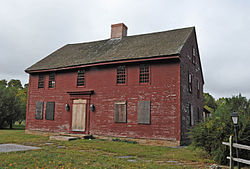John Randall House
John Randall House | |
 | |
| Location | Behind 41 CT 2, North Stonington, Connecticut |
|---|---|
| Coordinates | 41°24′59″N 71°51′37″W / 41.41639°N 71.86028°W |
| Area | 13.3 acres (5.4 ha) |
| Built | 1685-1720 |
| Architectural style | Georgian |
| NRHP reference No. | 78002877[1] |
| Added to NRHP | December 1, 1978 |
The John Randall House is a historic house on Connecticut Route 2 in North Stonington, Connecticut. Its earliest section dates to 1685, with the main block reaching its present configuration before 1720.[2][3] The house was restored in the 1930s by early preservationist Norman Isham and listed on the National Register of Historic Places on December 1, 1978.[1]
Description and history
[edit]The John Randall House is set on a rural parcel of land down a long lane on the west side of Route 2, about 2,000 feet (610 m) north of its junction with Interstate 95. It is a 2+1⁄2-story wood-frame structure, five asymmetrical bays wide, with a massive central stone chimney and clapboarded exterior. Its main entrance is framed by pilasters and a corniced entablature. The house is framed with inch-thick planking, a common technique of the period, although the planking was usually thinner, and is suggestive of two distinct periods of construction. The eastern parlor has a large fireplace wall finished in wooden paneling, the fireplace flanked by pilasters. The western parlor has a period built-in cabinet, wainscoting, and original plasterwork. The house was part of a farm named Anguilla Farm by the namesake son of the original proprietor, John Randall, a husbandman and Sabbatarian from England.
Darius Randall, a descendant who lived in the John Randall House was an abolitionist and the home was a stop on the Underground Railroad with a trap door in the Keep (Hearth Room) that leads to a secret room where slaves were hidden. In 1997, Randall’s Ordinary received this recognition from the Connecticut Historical Commission. [4]
Two emancipation releases have been found in the Stonington Town Records signed by William Randall: On March 24, 1808, William Randall “emancipated and made free a Negro man named Jabe Slave being 29 years of age well and healthy.” On March 11, 1807, William Randall freed “Rose, a 26-year-old Negro slave, who was well and healthy.” [5] https://mystoningtonancestors.wordpress.com/2011/08/13/randalls-ordinary-underground-railroad/
See also
[edit]- List of the oldest buildings in Connecticut
- National Register of Historic Places listings in New London County, Connecticut
References
[edit]- ^ a b "National Register Information System". National Register of Historic Places. National Park Service. March 13, 2009.
- ^ Historic Buildings of Connecticut website retrieved on 2021-04-16
- ^ "NRHP nomination for John Randall House". National Park Service. Retrieved 2015-01-31.
- ^ House of John Randall: https://www.wikitree.com/wiki/Space:House_of_John_Randall_1666_-_1720
- ^ Mystic and Stonington - a Storied Past and Present


